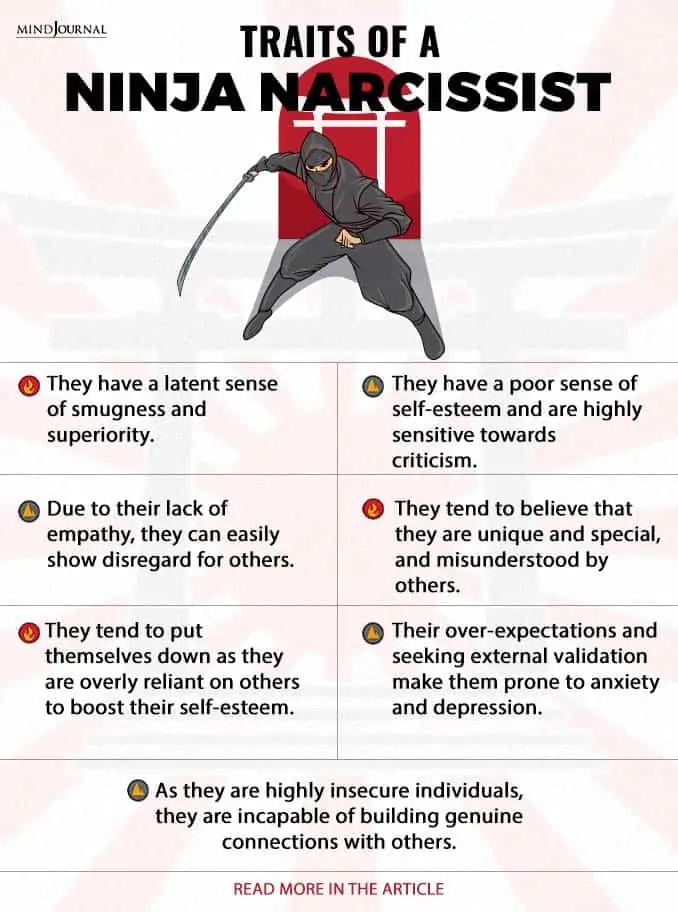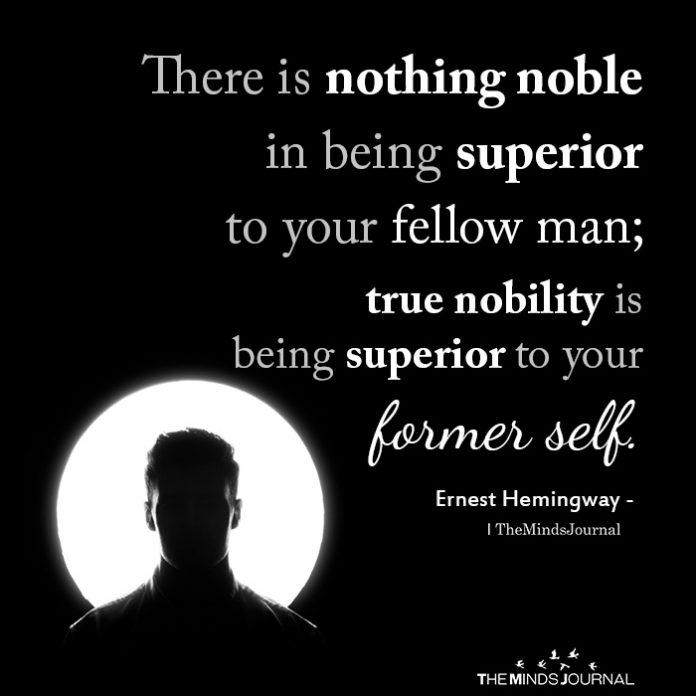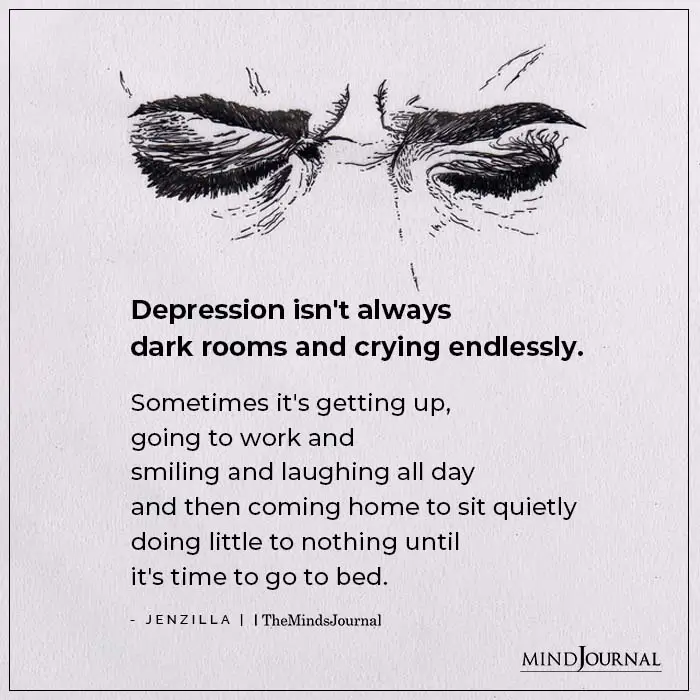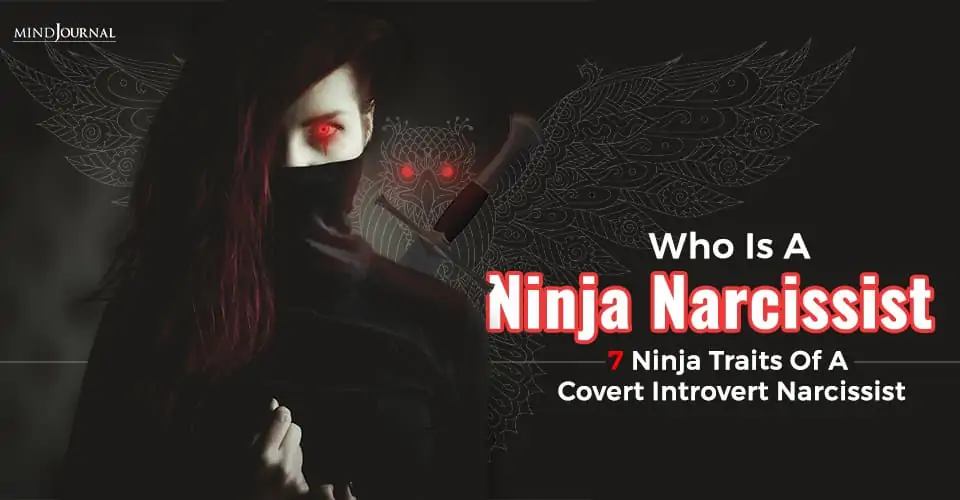Narcissists are often easy to identify. But some may have “ninja level” narcissistic personality traits that make it easier for them to blend in and masquerade as “normal” people. A ninja narcissist refers to a covert introvert narcissist and here’s how you can spot one.
Who Is A Ninja Narcissist?
A ninja narcissist is someone who shows their narcissism in highly subtle, hidden, and camouflaged ways, like a ninja. Although they may appear modest and shy on the outside, they have a hidden narcissistic personality disorder and can cleverly mask their covert narcissistic behaviors and their sense of superiority and self-importance.
They are also known as covert introvert narcissists, closet narcissists, hypersensitive narcissists, and a vulnerable narcissist. They tend to lack self-confidence and empathy and desperately crave attention and admiration.

As ninja narcissists behave very differently from covert narcissists, you may not be able to identify them in your life. They tend to be highly inhibited in their behavior and approach, yet have the same effect as normal narcissists.
Professor, private coach and author Preston Ni M.S.B.A. explains “This subtype of narcissism is more hidden, and yet can carry the same self-conceit and negative contagion as their extroverted counterpart.” This is why it is crucial that you learn how to spot their ninja traits so that you see beyond their masks and protect yourself from their toxicity and negativity.
Related: What is a Covert Narcissist?
Traits Of A Covert Introvert Narcissist

Here are some of the most common traits of a ninja narcissist that can help you identify these elusive individuals who are secretly filled with hidden toxicity:
- They prefer small animals and attribute human characteristics or behavior to their pets
- They are racists who believe they are better than others, especially other ethnicities
- They have multiple addictions to keep themselves distracted from difficult emotions like insecurities, sadness, frustration and loneliness
- They are always late and never take the responsibility for their unpunctuality
- They tend to withdraw or fall off the radar before someone identifies their insecurities and insincerities
- They feel insanely jealous towards successful people, even loved ones, and may express resentment or bitterness as they are excessively insecure
- They are compulsive liars who can completely change the narrative of true events to fit their own agenda. They can manipulate, rewrite, and erase previous events to fit their lies.
- They lack empathy or genuine emotions but may cry for their own selfish reasons, like for gaining attention or winning an argument.
- They are incapable of apologizing as they do not believe they can ever be wrong or make a mistake. “Narcissists can never utter, ‘I am sorry,’ because they are never, ever wrong,” explains Dr. Michael Morgan.
Related: Ninja Narcissists: How They Torment You With Their Sneak Attacks
Signs Of Ninja Narcissists
Here are some of the most common, yet hard-to-notice ninja signs of a covert introvert narcissist which are mostly driven by their deeply ingrained insecurities.
1. They have a hidden superiority complex
Ninja narcissists have a latent sense of smugness and superiority. They can be highly judgmental and tend to closely observe people as they listen to them. Introverted narcissists would rather quietly analyze others than speak their minds or actions. This makes them feel superior to others which are often hinted at by their upsetting, unapproving body language and detachment.
When interacting, they may be judgmental and critical, appear bored, distracted, avoid eye contact, be inattentive and dismissive in their nonverbal gestures. “This seemingly impenetrable smugness is, of course, a front, covering a sense of vulnerability within. Part of the insecurity may be the inability to relate to people meaningfully as human beings,” adds Preston Ni.

2. They are hypersensitive to criticism
A poor sense of self-esteem and insecurity are the basics of narcissistic personality disorder (NPD). For ninja narcissists, their insecurities may surface as high sensitivity towards criticism.
Although most of us don’t like to be criticized, a covert introvert narcissist may often react negatively and strongly to criticism. They can become dismissive, angry, or resort to sarcasm to show that it doesn’t affect them, even in the case of constructive criticism. However, they may feel humiliated, empty, mortified, or furious inside.
This is because criticism shatters their false and idealized beliefs about themselves and incites their deep-rooted insecurities.
Related: 16 Signs of Insecurity In A Narcissistic Person
3. They disregard others
Disregard and procrastination are some of the most crucial tools in the armory of a ninja narcissist. As they are driven by the desire for self-importance over everything else, they can go to great lengths to become and remain the center of attention.
Instead of manipulating others like an extroverted narcissist, a covert introvert narcissist will simply refuse to acknowledge you. Like most narcissists, they surround themselves with compassionate and caring individuals and seek opportunities to manipulate them to boost their own sense of self-worth.
Due to their lack of empathy, they can easily show disregard for others and how unimportant others are to the narcissist.
Licensed professional counselor Jodi Clarke, LPC/MHSP writes “Rather than explicitly telling you that you’re not important, they might stand you up on a date, wait until the last minute to respond to texts or emails, always show up late for events with you, or never make confirmed plans with you at all.”
They will never value your interest, opinion, or time making you feel irrelevant and unimportant.
4. They think they are special
Almost all narcissistic people think that they are special. But a covert introvert narcissist not only believes that they are special but misunderstood as well. They tend to believe that they are so unique and ahead of time, no one understands them.
They may often feel upset about being misunderstood by others but this is simply a manifestation of common narcissistic traits, like entitlement, grandiosity, and superiority. Preston Ni adds “By constructing the superficial belief that one is ‘exceptional’, the introvert narcissist creates a reassuring role, submerging the fearful and vulnerable true self.”
5. They minimize themselves
Ninja narcissists tend to put themselves down as they are strongly motivated by the need for admiration and praise. Instead of bragging about their accomplishment or exaggerating about their success, they tend to minimize it instead to make sure others praise them.
This is primarily related to their inner self-esteem issues. Psychologist Dr. Maury Joseph says “People with narcissism have to spend a lot of time making sure they don’t feel bad feelings, that they don’t feel imperfect or ashamed or limited or small.”
This is why covert narcissists need others to make them feel better. They are overly reliant on others to boost their self-esteem and they achieve this by putting themselves down.
Related: Why Narcissists Act the Way They Do
Hence, they tend to give backhanded compliments or act overly humble about their achievements with a camouflaged goal of getting praise, recognition, and compliments. This is a strategy for gaining external validation and reassurance of how great they are.
6. They are prone to depression
Most ninja narcissists tend to suffer from certain mental health issues, such as anxiety and depression. A 2017 study states “Narcissism, and specifically the vulnerable presentation, has been associated with depression.” The covert introvert narcissist may also be highly prone to feelings of emptiness as well.
Research reveals that people with vulnerable narcissism “may present with salient features of dysthymia, depression, and anhedonia.” The primary causes for such depressive feelings stem from the inability to acquire required external admiration and frustration from general over expectations. Moreover, fear of exposure or failure can lead to high levels of anxiety. Depression and emptiness can also result in suicidal ideation as well.

7. They have difficult relationships
As ninja narcissists are highly insecure individuals, they are incapable of building genuine emotional connections with others. They are masters in using aloofness as a defense mechanism to stay away from people and avoid being exposed to their flaws.
Their smugness helps them to hide their interpersonal weaknesses and use work and passion projects as shields to avoid socializing. As a result, they often find it hard to maintain relationships, which tend to be subtly toxic and unhealthy.
“Since one of the hallmark traits of narcissistic personality disorder is lack of empathy, the covert narcissist is not going to be emotionally responsive to their partner in a healthy way,” explains Jodi Clarke, LPC/MHSP.
Related: 5 Emotional Manipulation Tactics Covert Narcissists Use To Trap You In A Relationship
Protect Yourself From Ninja Narcissism
Narcissists, whether extroverted overt narcissists or covert introvert narcissists are not necessarily evil people. It is a personality disorder that can be treated with the help of mental health professional.
Although avoiding a narcissist is the best way to deal with them, if you have a loved one with traits of a ninja narcissist, then you should deal with the situation sensitively, instead of ignoring them.

Encouraging them to see a therapist is the first thing you should do when dealing with a family member or friend who is an introverted narcissist, especially if they are coping with anxiety or depression.
However, it is also important that you protect yourself from their covert tactics to manipulate and exploit you. Hence, you should set up strong personal boundaries, limit the volume of personal information you share, and reduce your interactions with them, while lending a helping hand to recovery.
Realated: 8 Things A Narcissist Fears The Most











Leave a Reply
You must be logged in to post a comment.